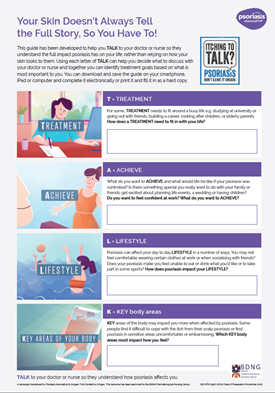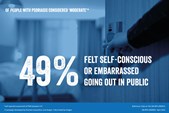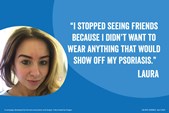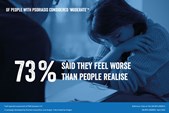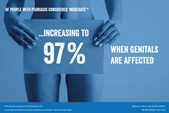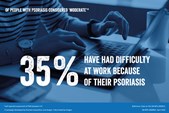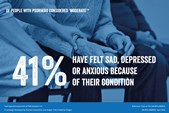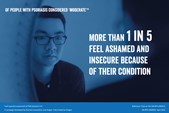'Itching to Talk?'
Psoriasis: Don't Leave It Unsaid
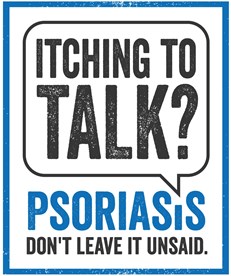 The Psoriasis Association collaborated with Amgen to empower people living with psoriasis to feel able to speak up and talk to their doctor or nurse about the condition's full life impact.
The Psoriasis Association collaborated with Amgen to empower people living with psoriasis to feel able to speak up and talk to their doctor or nurse about the condition's full life impact.
Your skin doesn’t always tell the whole story so don’t leave it unsaid.
The full impact psoriasis has on someone’s life often remains under-recognised. Living with psoriasis can impact negatively on the social, professional and psychological aspects of people’s lives, affecting their overall wellbeing and ability to lead a ‘normal’ life. At the same time, people often feel unable to talk to their doctor or nurse about the impact of their psoriasis beyond the physical symptoms, which can lead to feeling that they are not understood; while doctors and other healthcare professionals can find it hard to get an accurate picture of how psoriasis is affecting each person.
The ‘Itching to Talk?’ campaign, while relevant to everyone living with the condition, focuses on the experiences of people with moderate psoriasis. The campaign takes this approach because those with moderate psoriasis often find that the impact of their condition on their lives isn’t ‘moderate’ and, in some cases, can be as significant as in people living with severe psoriasis.
The campaign has been designed to help encourage a more collaborative dialogue between people living with psoriasis and healthcare professionals that achieves a better understanding of the total impact of psoriasis on people’s wellbeing. Only by people feeling encouraged and empowered to speak about how the condition affects their lives, and not just their skin, can we treat psoriasis fully and care for the whole individual.
Discussion guide
A discussion guide has been developed with the help of experts from the psoriasis community including people who are living with psoriasis themselves, support groups and specialist doctors and nurses. The guide is to help you prepare what you want to talk to your doctor or nurse about during a consultation in order to help them understand the real impact of psoriasis on your life and decide what treatment is best for you. Click here to download the discussion guide.
The guide can be saved to your device where you can fill it in and show it to your doctor or nurse, or it can be printed out and shared with them as a hard copy.
Animation
The following animation has also been developed, exploring some of the reasons people with psoriasis can find it hard to talk about the full impact of the condition with their doctor or nurse, and showing the prompts from the discussion guide that can help have a better conversation.
'Psoriasis - The Skin I'm In' film
‘Psoriasis – The Skin I’m In’ is a film by Dr Sandy McBride, Consultant Dermatologist, and storyteller Sarah Sutcliffe, which looks at the wider life impact of psoriasis, including emotional well-being and mental health. It gives meaningful insight into what it can be like to live with psoriasis and help people to raise the wider impact with the doctor or nurse.
A campaign developed by the Psoriasis Association and Amgen. Fully funded by Amgen. Job number: GB-NPS-1020-00010. Date of preparation: November 2020
Why 'Itching to Talk?'
Since 2018, we have been working to create a fuller picture of how psoriasis affects peoples’ lives. We have carried out large scale surveys among people with psoriasis and specialists in the psoriasis community, to compare the findings and gain better insights as to what is not being discussed during consultations and why. The findings from the research have been used to develop the ‘Itching to Talk?’ campaign.
In our surveys, people with psoriasis were asked to carry out a self-assessment, giving scores based on the severity, location, plaque characteristics and extent of the condition. These numbers were combined to arrive at a final score – known as a Psoriasis Area Severity Index (PASI) score. PASI is recognised by the National Institute for Health and Care Excellence (NICE) as a clinical assessment for psoriasis, often used during dermatology consultations. Statistics used in the campaign are based on findings from people with a self-reported PASI between five and nine, which is classified as moderate psoriasis.
What we found: Telling your story
The first stage of the campaign combines research findings with real-life stories to illustrate and raise awareness of the negative impact psoriasis can have beyond its physical symptoms. Here are some of the key findings and stories behind the campaign:
